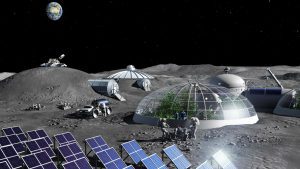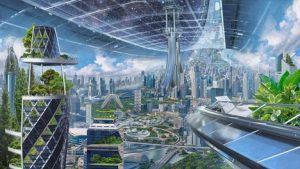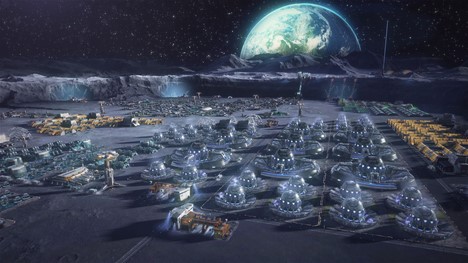Future of Space agriculture and food production
Future of Space agriculture ensures food security in space colonies. As we venture into the great unknown, one of the primary concerns for sustaining human life in space colonies is food security. It is imperative to develop robust agricultural systems that can operate efficiently in extraterrestrial environments. Space agriculture will play a crucial role in ensuring that space colonists have a consistent and reliable food supply. By cultivating crops in controlled environments, we can mitigate the risks associated with relying solely on Earth-based supplies, which can be disrupted due to various factors such as distance, transportation challenges, and potential delays.
Hydroponics and aeroponics revolutionize space food production. Traditional soil-based farming methods are not feasible in space due to the lack of soil and the need for efficient resource management. Hydroponics and aeroponics offer innovative solutions by allowing plants to grow without soil, using nutrient-rich water solutions and air, respectively. These methods not only maximize space utilization but also significantly reduce water and nutrient requirements. By implementing hydroponic and aeroponic systems, space colonies can achieve higher crop yields, faster growth rates, and more sustainable food production. This technological revolution in space agriculture will be essential for the long-term survival and prosperity of space settlers.
Healthcare in space colonies

Advanced medical technologies in the future of space. The health and well-being of space colonists are paramount to the success of space settlements. Advanced medical technologies will be indispensable in addressing the unique health challenges posed by living in space. Innovations such as 3D-printed organs, robotic surgery, and personalized medicine will enable space colonists to receive high-quality medical care. These technologies will help diagnose and treat illnesses, perform complex surgeries, and monitor the overall health of individuals in real-time. By leveraging advanced medical technologies, we can ensure that space colonists remain healthy and capable of thriving in their new environments.
Telemedicine solutions for space colonists’ healthcare needs. Given the vast distances between space colonies and Earth, traditional healthcare delivery methods are impractical. Telemedicine offers a viable solution by providing remote medical consultations and treatment options. Through telemedicine, space colonists can connect with medical professionals on Earth or within their own colonies, receive expert advice, and access necessary medical resources. This approach will be crucial for addressing emergencies, managing chronic conditions, and ensuring continuous healthcare support. By integrating telemedicine into space healthcare systems, we can enhance the quality of life for space colonists and maintain their health and well-being.
Energy resources for space habitats

Solar energy as a primary resource in the future of space. Solar energy is abundant and readily available in space, making it a primary resource for powering space habitats. By harnessing the power of the sun through advanced solar panels and photovoltaic systems, space colonies can generate clean and renewable energy. Solar energy will be essential for providing electricity, heating, and other energy needs in space habitats. Additionally, the use of solar energy reduces the reliance on Earth-based energy supplies and minimizes the environmental impact of space colonization. By prioritizing solar energy, we can create sustainable and self-sufficient space habitats.
Nuclear fusion for sustainable energy in space habitats. While solar energy is a valuable resource, it may not be sufficient to meet all the energy demands of space colonies. Nuclear fusion offers a promising solution for sustainable energy production in space. Unlike traditional nuclear fission, nuclear fusion produces minimal radioactive waste and has the potential to generate vast amounts of energy. By developing compact and efficient nuclear fusion reactors, space habitats can achieve a stable and long-term energy supply. This technology will be crucial for supporting large-scale space settlements and ensuring their energy independence.
Legal frameworks for space settlements
International treaties shaping the future of space settlements. As space colonization becomes a reality, it is essential to establish legal frameworks that govern the activities and interactions of space settlers. International treaties, such as the Outer Space Treaty and the Moon Agreement, play a pivotal role in shaping the future of space settlements. These treaties outline principles for the peaceful use of space, prohibit the appropriation of celestial bodies, and promote international cooperation. By adhering to these treaties, we can ensure that space colonization is conducted in a responsible and ethical manner, fostering collaboration and preventing conflicts.
Property rights in the future of space colonies. One of the key legal challenges in space colonization is the issue of property rights. As humans establish settlements on celestial bodies, questions arise regarding ownership and resource utilization. Developing clear and enforceable property rights frameworks will be essential for promoting investment, innovation, and sustainable development in space. These frameworks should address issues such as land ownership, resource extraction, and intellectual property. By establishing property rights in space, we can create a stable and predictable legal environment that encourages private sector involvement and supports the growth of space colonies.
Cultural and social aspects of space living

The future of space: New social norms and interactions. Space colonization will bring about significant changes in social norms and interactions. As humans adapt to living in confined and isolated environments, new social dynamics will emerge. Space colonists will need to develop strong community bonds, cooperation, and resilience to thrive in their new surroundings. The unique challenges of space living, such as limited personal space and prolonged isolation, will require innovative approaches to social interactions and conflict resolution. By fostering a sense of community and mutual support, space colonists can create a harmonious and cohesive society.
Cultural evolution in the future of space colonies. Space colonization will also drive cultural evolution, as humans bring their diverse backgrounds, traditions, and values to new environments. The blending of different cultures in space colonies will lead to the creation of unique and evolving cultural identities. Space settlers will develop new customs, art forms, and ways of life that reflect their experiences and aspirations. This cultural evolution will enrich the human experience and contribute to the overall success of space settlements. By embracing diversity and promoting cultural exchange, space colonies can become vibrant and dynamic communities.
Transportation systems for interplanetary travel
Advancements in propulsion for the future of space colonies. Efficient and reliable transportation systems are crucial for the success of interplanetary travel and space colonization. Advancements in propulsion technologies, such as ion drives, nuclear thermal propulsion, and electromagnetic propulsion, will revolutionize space travel. These technologies offer higher speeds, greater fuel efficiency, and reduced travel times, making interplanetary travel more feasible and accessible. By investing in and developing advanced propulsion systems, we can overcome the challenges of long-distance space travel and enable the establishment of permanent space colonies.
Sustainable fuel sources for interplanetary travel in the future of space. The sustainability of interplanetary travel depends on the availability of reliable and renewable fuel sources. Traditional chemical propellants are limited in supply and pose environmental challenges. Sustainable fuel sources, such as hydrogen, solar energy, and in-situ resource utilization (ISRU), offer promising alternatives. By harnessing these sustainable fuel sources, space missions can reduce their dependence on Earth-based supplies and minimize their environmental impact. Developing efficient and scalable methods for producing and utilizing sustainable fuels will be essential for the long-term success of interplanetary travel and space colonization.
Educational systems in space colonies
Adapting curricula for the future of space colonies. Education is a fundamental aspect of human development and will be crucial for the success of space colonies. Adapting curricula to address the unique challenges and opportunities of space living will be essential. Space colonists will need to acquire knowledge and skills related to space science, engineering, agriculture, and healthcare. Additionally, educational systems should promote critical thinking, problem-solving, and adaptability to prepare individuals for the dynamic and evolving nature of space settlements. By developing specialized curricula, we can ensure that space colonists are well-equipped to thrive in their new environments.
Utilizing technology for immersive learning in the future of space. Technology will play a vital role in enhancing educational experiences in space colonies. Virtual reality (VR), augmented reality (AR), and online learning platforms can provide immersive and interactive learning opportunities. These technologies can simulate real-world scenarios, facilitate remote collaboration, and offer personalized learning experiences. By integrating technology into educational systems, space colonists can access high-quality education, regardless of their physical location. This approach will be essential for fostering continuous learning, innovation, and personal growth in space settlements.
Long-term sustainability of space habitats

Importance of recycling systems for the future of space colonies. Long-term sustainability is a critical consideration for space habitats. Efficient recycling systems will be essential for managing waste, conserving resources, and minimizing environmental impact. Closed-loop systems that recycle water, air, and nutrients can ensure the continuous availability of essential resources. By implementing advanced recycling technologies, space colonies can reduce their dependence on Earth-based supplies and create self-sustaining ecosystems. This approach will be crucial for maintaining the health and well-being of space colonists and ensuring the long-term viability of space habitats.
Utilizing renewable energy sources for long-term space habitat sustainability. Renewable energy sources are vital for the long-term sustainability of space habitats. Solar energy, nuclear fusion, and other renewable sources can provide reliable and clean energy for space settlements. By prioritizing the use of renewable energy, space colonies can reduce their environmental footprint, ensure energy independence, and support sustainable development. Additionally, integrating energy storage solutions, such as batteries and fuel cells, can enhance the resilience and stability of space habitats. By leveraging renewable energy sources, we can create sustainable and thriving space colonies that can endure for generations to come.
Conclusion
In conclusion, the future of space colonies holds immense promise and potential. By addressing the challenges of food production, healthcare, energy resources, legal frameworks, social dynamics, transportation, education, and sustainability, we can pave the way for successful and thriving space settlements. The journey to space colonization will require innovation, collaboration, and a commitment to the well-being of future space colonists. As we venture into the cosmos, we must strive to create a harmonious and sustainable future for humanity beyond Earth.












